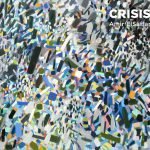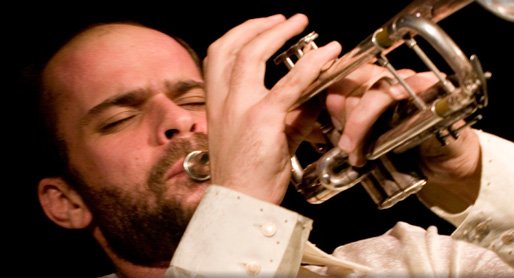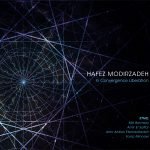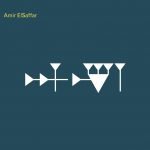

Amir ElSaffar
Iraqi-American trumpeter, santur player, vocalist, and composer Amir ElSaffar has distinguished himself with a mastery of disparate musical styles and a singular approach to combining aspects of Middle Eastern music with American jazz, extending the boundaries of each tradition. A skilled jazz trumpeter with a classical background, ElSaffar has created new techniques to play microtones and ornaments that are idiomatic to Arabic music but are not typically heard on the trumpet. Additionally, he is an acknowledged performer of the classical Iraqi maqam tradition, and performs actively in the US, Europe and the Middle East as a vocalist and santur player. As a composer, ElSaffar has used the microtones found in maqam music to create a unique approach to harmony and melody, establishing himself as an important voice in an age of cross-cultural music making. ElSaffar has received grants to compose music from Chamber Music America, the Jazz Institute of Chicago, the Jerome Foundation, Festival of New Trumpet Music (FONT), and the Painted Bride Arts Center in Philadelphia.
Born near Chicago in 1977 to an Iraqi immigrant father and an American mother, ElSaffar heard recordings of Louis Armstrong, Ella Fitzgerald, and the Blues Brothers Soundtrack at a young age from his fathers record collection. He received his first musical training in the Lutheran Church Choir at the school he attended, and his mother taught him to sing and play American folk songs on ukulele and guitar when he was nine.
ElSaffar found his calling with the trumpet at the age of 10, and by his late teens began performing professionally throughout the Chicago area with blues, jazz, rock, and salsa bands, as well as with the Civic Orchestra of Chicago, where he worked with conductors such as Pierre Boulez, Mstislav Rostropovich, and Daniel Barenboim. In 1999, he performed on Barenboims Teldec release, Tribute to Ellington, with members of the Chicago Symphony.
In 2000, after completing a degree in classical trumpet from DePaul University, he moved to New York, where had opportunities to work with jazz legend Cecil Taylor, in addition to musicians of his generation such as Rudresh Mahanthappa and Vijay Iyer, who incorporated the music of their cultural backgrounds into a jazz context. In 2001, ElSaffar won the Carmine Caruso International Jazz Trumpet Competition, and the following year used the funds to begin an intensive study of the Iraqi Maqam, in addition to other forms of Arabic music. He went on a five-year journey, traveling to Iraq, throughout the Middle East, and to Europe, pursuing masters who could impart to him this centuries-old oral tradition. He soon became versed in maqam, learning to play the santur (Iraqi hammered dulcimer) and to sing, and in 2006 founded Safaafir, the only ensemble in the US performing Iraqi Maqam in its traditional format.
Later the same year, ElSaffar received commissions from the Painted Bride Arts Center in Philadelphia and from the Festival of New Trumpet Music (FONT), to compose Two Rivers, a suite that invokes Iraqi musical traditions and frames them in a modern Jazz setting. ElSaffar has since received commissions from the Jerome Foundation, the Jazz Institute of Chicago, and Chamber Music America and has continued developing a singular approach to integrating Middle Eastern tonalities and rhythms into an American jazz context, releasing three albums, Two Rivers (2006), Radif Suite (2010), and Inana (2011) to critical acclaim. He has also composed for theater projects and film soundtracks, and appeared in Jonathan Demmes Oscar-nominated film, Rachel Getting Married. In addition to his busy performance schedule, ElSaffar curates a weekly concert series at Alwan for the Arts, New Yorks premiere center for Middle Eastern arts and culture.





